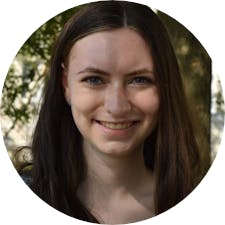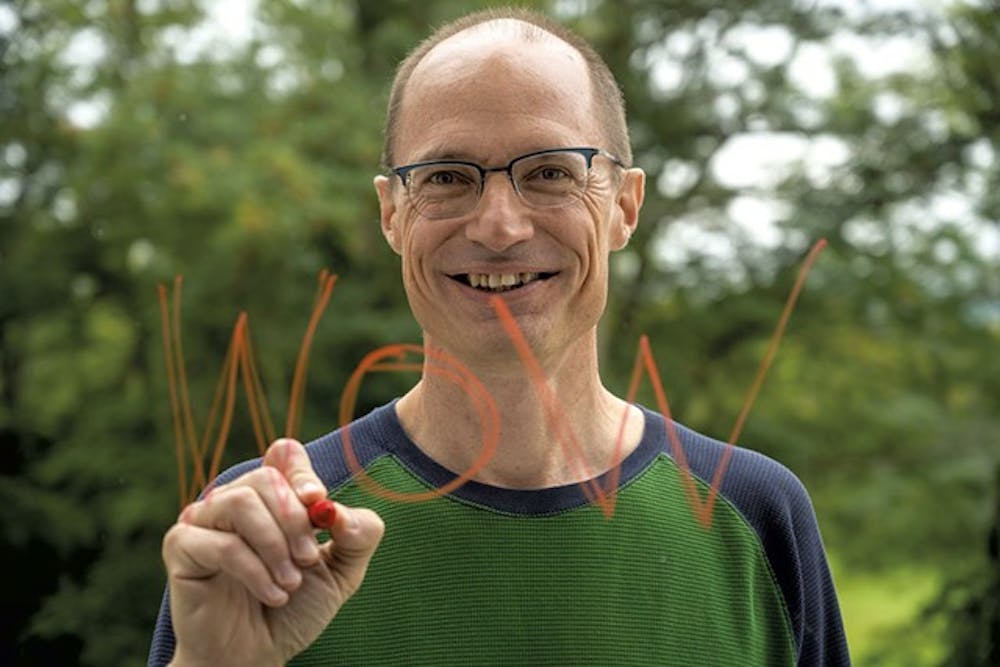If you are a Middlebury student, chances are you already know Mark Saltveit’s voice.
“Good afternoon, the Davis Family Library will be closing at 5 p.m. today. Should you want to continue working, Crossroads Cafe is open 24/7, although I don’t know why you would want to continue working when it’s such a beautiful day outside,” his voice bellows across the library intercoms on a Saturday afternoon, jolting students from their laptop-induced haze.
Some are spurred to action, typing frantically to make up for lost time, while others see the announcement as a divine sign to leave.
Saltveit is a Circulation Desk supervisor at Davis, where he has worked since moving to Middlebury in 2020 with his wife, Theatre Professor Olga Sanchez Saltveit. His schedule at the library is heavy on nights and weekends, leading to his task as “the voice of Davis.” As a supervisor, he also works closely with the two student employees on duty.
“The best part of the job is just working with the students,” Saltveit said. “I really like the students I’ve met at Midd — they’re interesting, from around the world. They speak a bunch of different languages, come from different countries. It’s just fascinating.”
The Davis microphone isn’t the only one for which Saltveit has a proclivity, however: He is also an active stand-up comedian. After getting his start at west coast boutique comedy clubs in California and his home state of Oregon, Saltveit now travels across the Atlantic every year for the Edinburgh Festival Fringe, where he hosts creative events riffing on his eclectic interests. For instance, one of his kid-friendly performances is titled “Ancient Coins from Forgotten Kingdoms.”
Saltveit is quick to point out that he isn’t making a mint, however, as he performs at what is known as the Free Fringe, which is open to all. Closer to home, Saltveit hosted Town Hall Theater’s “Tina Friml and Friends Night of Comedy” last June.
Of all these hats, the one he is best known for is that of a specific breed of wordsmith: a palindromist — which, he corrected me immediately, ought to be pronounced pa-LIN-dro-mist, not pa-lin-DRO-mist. It was our own little leviOsa not levioSA moment. Indeed, the Hermione Granger metaphor may not be far off — with all his interests, it seems that Saltveit too would benefit from a Time-Turner.
A key moment to turn back to is March 2012. In Brooklyn, Saltveit was competing in the inaugural World Palindrome Championship, hosted by enigmatologist and New York Times crossword editor Will Shortz, who’s an idol of grid-obsessed word nerds everywhere (play The Campus’ weekly crossword here). In a set amount of time, contestants had to write an original palindrome (a word or phrase that is the same forwards and backward, like “racecar” or “kayak”) according to a prompt.
Saltveit explained that writing a palindrome is like an inkblot test: You never know what’s going to come out. “You have to take what the language gives you,” he said. More concrete advice for writing your own? Start in the middle.
Saltveit won the contest, becoming the first World Palindrome Champion, with the phrase “Devil Kay fixes trapeze part; sex if yak lived.”
Saltveit cited a childhood interest in palindromes but admitted that he didn’t reconnect with the form until the ’90s. After a job reviewing zines, his bosses urged him to create his own.
“No one was doing anything about palindromes,” Saltveit said. “And it was the perfect little niche topic for a zine.”
With that, The Palindromist magazine was born. Saltveit described the blossoming of a community of several hundred individuals obsessed with tracking down symmetrical sentences, including early subscriber Shortz. This group of logophiles are also the subject of the 2021 documentary “The Palindromists,” which features Saltveit. He still aims to publish an issue of the magazine every few years, stubbornly sticking to print.
Saltveit’s passion for palindromes has also pushed him toward formal academia. His personal interest in the history of the form led him down a series of rabbit holes.
“Before I knew it, I was the world’s expert on Latin palindromes,” he said, admitting that this was shocking for a man who did not speak Latin.
Still, with a degree in social science from Harvard University, Saltveit was up to the challenge.
“I discovered, somewhat accidentally, a lost collection of Roman poetry,” Saltveit exclaimed, recalling his aha moment in the archives of the British Library. The text he was referring to dates from sometime between the fourth and sixth centuries and is so worn that Saltveit and his research team (including Davis Circulations Specialist Rachel Fickes and Professor of Classics at Cornell University Mike Fontaine) are relying on high-tech scans to help them decipher the full text. For now, it includes eight palindromes, five of which are being read for the first time by modern scholars. “It’s kind of a big deal in medieval scholarship, or even classics,” he added.
What’s next? In between editing an academic article about this latest project, Saltveit plans to attend a six-week clown course in France this summer before returning to Free Fringe.
While constant reinvention might sound exhausting to some, Saltveit isn’t losing any sleep. Since finding a book about Chinese philosophy on his parents’ shelf as a tween, Saltveit has engaged and experimented with Taoism in his own life. “It keeps ringing true,” he said. He even writes a blog called Taoish.
“Part of my Taoist philosophy is to just follow where it leads,” he said. “And not worry about imposing a structure on it.”

Acadia Klepeis ’24 (she/her) is an Arts & Culture Editor.
She is an English major and a French and Francophone Studies minor. Last year, Cadi studied literature in Paris and in Oxford through Middlebury’s school abroad programs. She spent this past summer working as a communications intern for the Vermont Arts Council. Previously, she completed internships with Tuttle Publishing, Theatre in Paris, and Town Hall Theater. Cadi is also on the board for Middlebury College Musical Theatre.




